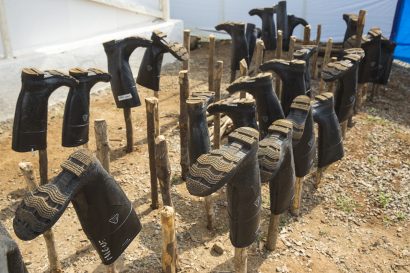Tag: fragile states
According to the World Bank, fragility, conflict, and violence is a critical development challenge that threatens efforts to end extreme poverty, affecting both low- and middle-income countries (LMICs). Many of the world’s crises are caused by or exacerbated by fragility, from violent conflict to internal and external displacements and climate shocks. Compared to other LMICs, fragile… Read more
An estimated 75 million children cannot go to school because they have been driven from their homes by war, crisis, and natural disaster. This deprivation in turn destabilises vulnerable regions because uneducated children grow into at-risk teenagers and young adults. To strengthen its education in emergencies (EiE) programming, the U.K. Department of International Development (DFID)… Read more
In 2014, the Norwegian Refugee Council (NRC) engaged the Women’s Refugee Commission (WRC) to conduct an external review of the NRC Youth Education Pack (YEP) model that has been implemented in multiple post-crisis and fragile-state contexts since 2003. This review notes, due mostly to lack of data, WRC was unable to definitively answer the questions… Read more
This report provides a broad review of the field of education in fragile states and charts a new agenda for maximising education’s contribution to the development and well-being of people living in these contexts. The authors find compelling evidence showing that education can play an important role for accelerating progress in fragile states for four… Read more
Research on education and conflict shows that education systems are not politically neutral but are an important part of the political economy that can exacerbate or mitigate conflict. The curriculum can be used as a vehicle to promote dominant ideologies. There are numerous instances where school curricula have been used to oppress particular ethnic groups… Read more
This paper reviews the evidence on what interventions designed to raise incomes in fragile states work, and whether stimulating employment promotes social stability. Skills training and microfinance have shown little impact on poverty or stability, especially relative to programme cost. In contrast, the evidence suggests that injections of capital (cash, capital goods, or livestock) may… Read more
In recognition of the challenges of working effectively in conflict-affected and fragile situations, including insecurity, weak state capacity, difficult political environments and acute humanitarian crises, the OECD-DAC developed a series of Principles for Good International Engagement in Fragile States and Situations in April 2007 to complement the commitments set out in the Paris Declaration on Aid Effectiveness. DFID has… Read more
Tim Martineau is a Senior Lecturer in Human Resource Management (HRM) at the Liverpool School of Tropical Medicine and leads a growing team working on health workforce issues. In this video, he talks about the Health Systems in Fragile and Conflict-Affected States Working Group, a subgroup of Health Systems Global which is a society for… Read more
Barbara McPake is a health economist specialising in health policy and health systems research. She is one of two Research Directors of ReBUILD, a UK Department for International Development funded Research Programme Consortium on health systems development. In this video, she talks about the consortium’s work in building resilient and responsive health systems in conflict-affected states. ReBUILD… Read more
In this presentation Barbara McPake, the Research Director of ReBUILD, talks about Ebola in the context of conflict-affected states and health systems with a focus on West Africa – in particular comparing responses to Ebola outbreaks in Northern Uganda and Sierra Leone. The ReBUILD Consortium is a research partnership funded by the UK Department for… Read more
This was an extensive query to tackle in 3 days. The result is an annotated bibliography covering a selection of key papers identified through a rapid search on the different nutrition interventions. Section 2 includes a number of resources on community-based management with evaluations finding it to be cost effective. Sections 3-5 are on breastfeeding,… Read more




